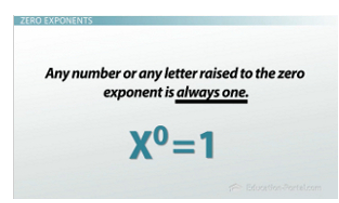I want to make sure that you understand that x^-a does not mean -x^a. Once again, the negative exponent has nothing to do with positive or negative numbers. If the exponential is negative in the numerator, or the top, it tells us the exponential is actually positive in the denominator. If the exponential is negative in the denominator, or the bottom, it tells us the exponential is actually positive in the numerator.
If you see a negative exponent, flip it to a positive. That is, if the exponent is negative in the numerator, flip it positive to the denominator. If the exponent is negative in the denominator, flip it positive to the numerator.
Let's say I have x^-4. Now remember, x^-4 can be written as a fraction (x^-4)/1. Remember, if it's negative in the numerator, you flip it positive to the denominator. So that's the same thing as saying 1/(x^4).
In this next example, x^-7 is in the denominator. We're going to flip it positive to the numerator. x^7 is the same thing as 1/(x^-7).
Zero Exponents

The formula for zero exponents
I think the zero exponent is really fun! Basically, the formula says that anything - any number, any letter - raised to the zero exponent is always one. So when I have x^0, it's 1. Let's say I had something funny like 999,999^0. It's still 1!
The Quotient of Powers Rule says that when we divide exponentials with the same base, we subtract their exponents. So, I have (x^3)/(x^3). Remember, we subtract their exponents. So that would be x^(3-3), which is x^0.
But where does the 1 come from? We have (x^3)/(x^3). That is, (x*x*x) on the top, or numerator, and (x*x*x) on the bottom, or denominator. x/x is 1, x/xis 1, and x/x is 1. When we multiply those together (1*1*1), we get 1! So that pretty much proves it: x^0 = 1!